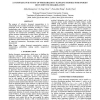Free Online Productivity Tools
i2Speak
i2Symbol
i2OCR
iTex2Img
iWeb2Print
iWeb2Shot
i2Type
iPdf2Split
iPdf2Merge
i2Bopomofo
i2Arabic
i2Style
i2Image
i2PDF
iLatex2Rtf
Sci2ools
117
click to vote
ICASSP
2008
IEEE
2008
IEEE
A comparative study of probabilistic ranking models for spoken document summarization
The purpose of extractive document summarization is to automatically select a number of indicative sentences, passages, or paragraphs from the original document according to a target summarization ratio and then sequence them to form a concise summary. In the paper, we present a comparative study of various supervised and unsupervised probabilistic ranking models for spoken document summarization on the Chinese broadcast news. Moreover, we also investigate the possibility of using unsupervised summarizers to boost the performance of supervised summarizers when manual labels are not available for the training of supervised summarizers. Encouraging results were initially demonstrated.
Document Summarization | Extractive Document Summarization | ICASSP 2008 | Signal Processing | Target Summarization Ratio |
| Added | 30 May 2010 |
| Updated | 30 May 2010 |
| Type | Conference |
| Year | 2008 |
| Where | ICASSP |
| Authors | Shih-Hsiang Lin, Yi-Ting Chen, Hsin-Min Wang, Bin Chen |
Comments (0)

